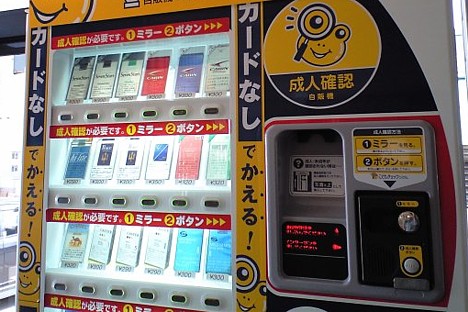
As the use of e-money gains popularity in Japan, versatile FeliCa RFID readers that support multiple forms of electronic currency are popping up in convenience stores and vending machines, making it easier for users to pay with the swipe of a phone. Electronics giant NEC is jumping in on the action with a FeliCa payment terminal modeled after a life-sized android.
The robot -- a prototype that NEC demonstrated at the recent iEXPO 2008 trade show in Tokyo -- incorporates existing technology, which means a finished version can be produced and deployed at short notice. NEC hopes to land it a job at an amusement park selling entrance tickets to visitors with FeliCa-enabled wallet phones, also known as osaifu keitai.
To pay the robot, users simply select the appropriate e-money icon on the robot's chest-mounted touch screen panel and then swipe their phone over the reader/writer embedded in the left hand. The robot can also be programmed to transfer electronic coupons and other data to the user's phone when payment is made.

Other features include a camera system that can work with face recognition technology to identify and profile park visitors. If asked to do so, the robot can recommend specific attractions based on the person's apparent age and gender.
It is unclear whether any theme parks have expressed interest in hiring the robot. If not, NEC could easily equip it with fingerprint scanners and put it to work at immigration counters to gather biometric data on foreigners in Japan. Tourists would love it.
[Source: IT Media]


 As part of the age-verification system, most of Japan's 570,000 cigarette vending machines are being outfitted with RFID readers that check the purchaser's Taspo age-verification card. Smokers without a Taspo card can now either buy their cigarettes in person over the counter or use one of 4,000 special machines equipped with face-recognition systems (these machines do not require Taspo cards). More face-recognition machines are on the way, according to vending machine manufacturer Fujitaka, who developed the face-recognition hardware.
As part of the age-verification system, most of Japan's 570,000 cigarette vending machines are being outfitted with RFID readers that check the purchaser's Taspo age-verification card. Smokers without a Taspo card can now either buy their cigarettes in person over the counter or use one of 4,000 special machines equipped with face-recognition systems (these machines do not require Taspo cards). More face-recognition machines are on the way, according to vending machine manufacturer Fujitaka, who developed the face-recognition hardware. 

 A new project to develop "unmanned hotels" in Japan may soon eliminate the burdensome task of checking in at the front desk. A consortium of five companies, including the trading company
A new project to develop "unmanned hotels" in Japan may soon eliminate the burdensome task of checking in at the front desk. A consortium of five companies, including the trading company  East Japan Railway Company (
East Japan Railway Company (
 On January 25, Fujitsu, AEON and Dai Nippon Printing announced plans to conduct a trial run of a retail support system that uses IC tags and data display terminals. In this retail service system of the future, customers will be able access a variety of product information by electronically reading tags placed on supermarket shelves. The trial run will be conducted at Jusco supermarket (Yachiyo-midorigaoka branch) for a five-week period beginning February 6, in Yachiyo City, Chiba.
On January 25, Fujitsu, AEON and Dai Nippon Printing announced plans to conduct a trial run of a retail support system that uses IC tags and data display terminals. In this retail service system of the future, customers will be able access a variety of product information by electronically reading tags placed on supermarket shelves. The trial run will be conducted at Jusco supermarket (Yachiyo-midorigaoka branch) for a five-week period beginning February 6, in Yachiyo City, Chiba.